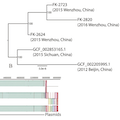Abstract
Background The emergence of carbapenem-resistant Klebsiella pneumoniae (CRKP) poses a looming threat to human health. Although there are numerous studies regarding porin alteration in association with the production of ESBLs and/or AmpC β-lactamase, a systematic study on the treatment-emergence of porins alteration in antibiotic resistance does not yet exist. The aim of this study was to investigate the underlying mechanism of resistance of K. pneumoniae during carbapenem treatment.
Results Here, we report three strains (FK-2624, FK-2723 and FK-2820) isolated from one patient before and after imipenem treatment during hospitalization. Antibiotic susceptibility testing indicated that that the first isolate, FK-2624, was susceptible to almost all tested antimicrobials, being resistant only to fosfomycin. The subsequent isolates FK-2723 and FK-2820 were multidrug resistant (MDR). After imipenem therapy, FK-2820 was found to be carbapenem-resistant. PCR and Genome Sequencing analysis indicated that oqxA, and fosA5, were identified in all three strains. In addition, FK-2624 also harbored blaSHV-187 and blaTEM-116. The blaSHV-187 and blaTEM-116 genes were not detected in FK-2723 and FK-2820. blaDHA-1, qnrB4, aac (6′)-IIc, and blaSHV-12, EreA2, CatA2, SulI, and tetD, were identified in both FK-2723 and FK-2820. Moreover, the genes blaDHA-1, qnrB4, aac (6′)-IIc were co-harbored on a plasmid. Of the virulence factors found in this study, ybtA, ICEKp6, mrkD, entB, iroN, rmpA2–6, wzi16 and capsular serotype K57 were found in the three isolates. The results of pairwise comparisons, multi-locus sequencing typing (MLST) and pulsed-field gel electrophoresis (PFGE) revealed high homology among the isolates. Sodium dodecyl sulfate polyacrylamide gel electrophoresis (SDS-PAGE) results showed that isolate FK-2820 lacked OmpK36, with genome sequence data validating that there was a premature stop codon in the ompK36 gene and real-time RT-PCR suggesting high turnover of the ompK36 non-sense transcript in FK-2820, with the steady-state mRNA level 0.007 relative to the initial isolate.
Conclusion This study in China highlight that the alteration of outer membrane porins due to the 14-day use of imipenem play a potential role in leading to clinical presentation of carbapenem-resistance. This is the first description of increased resistance developing from a carbapenem-susceptible K. pneumoniae with imipenem treatment driven by outer membrane remodeling.
